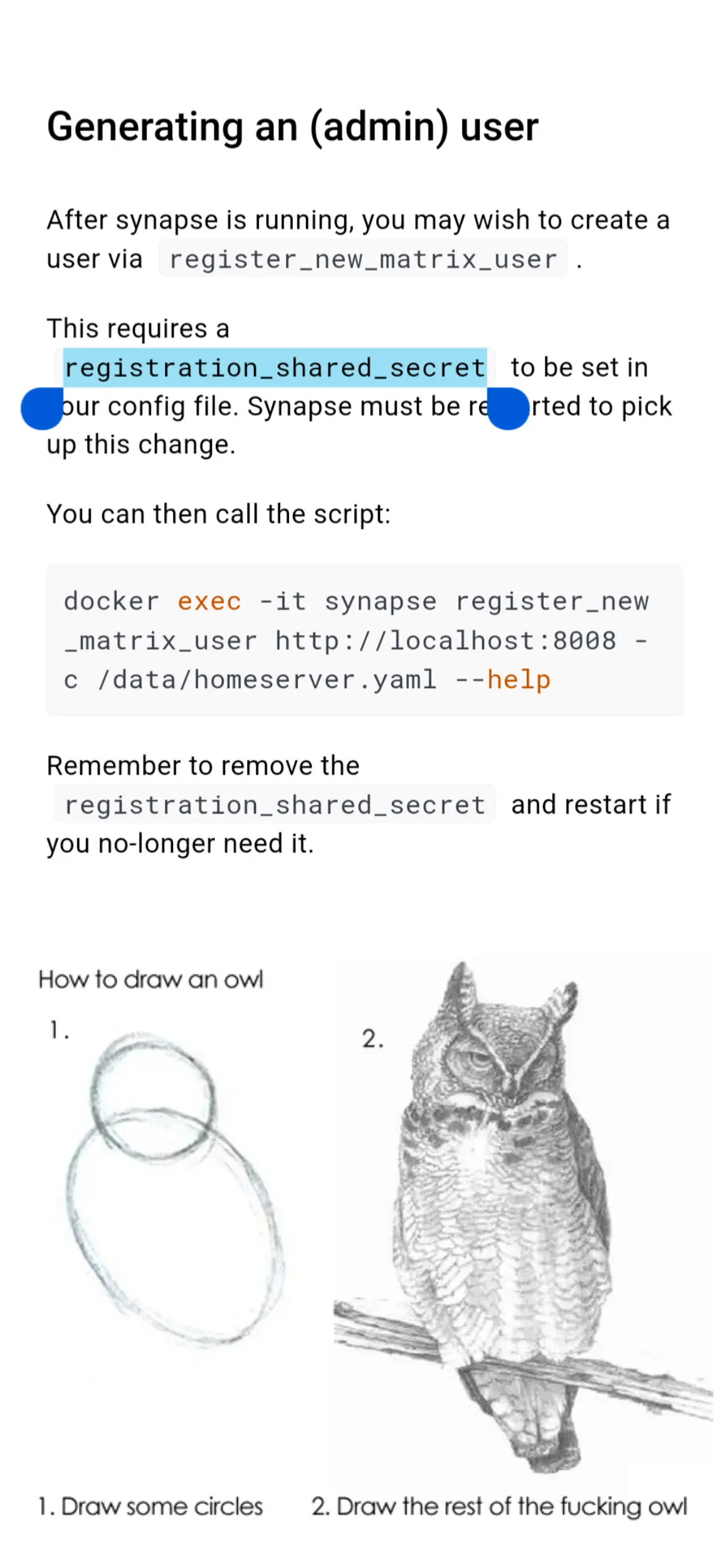Dearest ChatGPT, What the fuck is a shared secret?
Selfhosted
A place to share alternatives to popular online services that can be self-hosted without giving up privacy or locking you into a service you don't control.
Rules:
-
Be civil: we're here to support and learn from one another. Insults won't be tolerated. Flame wars are frowned upon.
-
No spam posting.
-
Posts have to be centered around self-hosting. There are other communities for discussing hardware or home computing. If it's not obvious why your post topic revolves around selfhosting, please include details to make it clear.
-
Don't duplicate the full text of your blog or github here. Just post the link for folks to click.
-
Submission headline should match the article title (don’t cherry-pick information from the title to fit your agenda).
-
No trolling.
Resources:
- selfh.st Newsletter and index of selfhosted software and apps
- awesome-selfhosted software
- awesome-sysadmin resources
- Self-Hosted Podcast from Jupiter Broadcasting
Any issues on the community? Report it using the report flag.
Questions? DM the mods!
It's the thing you only tell your "ride-or-die bitch" server.
An application password, basically
Being able to find and read software documentation and knowing how to use the tools that automate software deployment are why SRE/devops/cloud guys get paid the big bucks.
I definitely recommend synapse over dendrite or conduit btw. dendrite and conduit have a bunch of missing features, and my first attempt at dendrite server shat the bed with its NATS store and died. I definitely recommend Synapse for all matrix servers going forward.
The .well-known entries I found were the hardest to test, since synapse doesn't provide a web server for them, and Element throws a fit if you don't have CORS set up exactly in the way it wants you to.
I mostly have my matrix server working now, with bridges even. However, Element randomly logs itself out on a daily basis which is really frustrating :/
I haven’t done any programming in over 20 years, but I think I can make a contribution to projects by trying to improve documentation, once I start using some projects
But this is some Docker shit. For myself Docker always feels a little corporate. It's just not very conventional with these multiline commands just to run a command inside a container. Especially the obligatory "-it" to fucking see anything. It's not really straight forward. But if you get used to it and you can make a lot of aliases to use it more easily.
The dankest depths of archlinux wiki. Written by a guy so far gone, so war harden by reading through source code and poorly written technical documentation, ancient forums, leaving no stone unturned. A task so twisted it drives most men crazy.
1% of arch users will ever need this wiki and few have gone through this Herculean task. For them, the first draft is enough, it's all you can ask of a mind so twisted and broken. Alas it's as unreadable as the source code and as hard to understand as the forum post from 2009.
Legit, I run Synapse, the registration shared secret is just a random string you supply and add it to the home server ymal
Then you use that string to create users by API.
Idonno, felt straight forward to me
Who is ymal?
the documentation is just missing clearly stating that fact, though from what i recall i think that might be said in the config file?
I recently set up Synapse just to play around with the protocol, and I do not remember this instruction at all. Where did you get this?
Not sayin nothin, but you might want to look at Matrix Conduit. you won't want to keep it open, but it's much easier to set up and it uses a tiny amount of the resources. Synapse kills the server I'm running both conduit and lotide on just fine.
this is just because it's webhosted, anything that does anything on the web sucks and is terrible, everything else is actually so much better it's fucking baffling to me.
web 2.0 is dead to me. web 3.0 won't get off of the ground, we need web 2 electric boogaloo
~~2020 called, they want their opinion back~~ I respectfully disagree
Alternatively, you can create new users from the command line.
This can be done as follows:
If synapse was installed via pip, activate the virtualenv as follows (if Synapse was installed via a prebuilt package, register_new_matrix_user should already be on the search path):
cd ~/synapse
source env/bin/activate
synctl start # if not already running
Run the following command:
register_new_matrix_user -c homeserver.yaml
This will prompt you to add details for the new user, and will then connect to the running Synapse to create the new user. For example:
New user localpart: erikj
Password:
Confirm password:
Make admin [no]:
Success!
This process uses a setting registration_shared_secret, which is shared between Synapse itself and the register_new_matrix_user script.
It doesn't matter what it is (a random value is generated by --generate-config), but it should be kept secret, as anyone with knowledge of it can register users, including admin accounts, on your server even if enable_registration is false.
https://element-hq.github.io/synapse/latest/setup/installation.html
